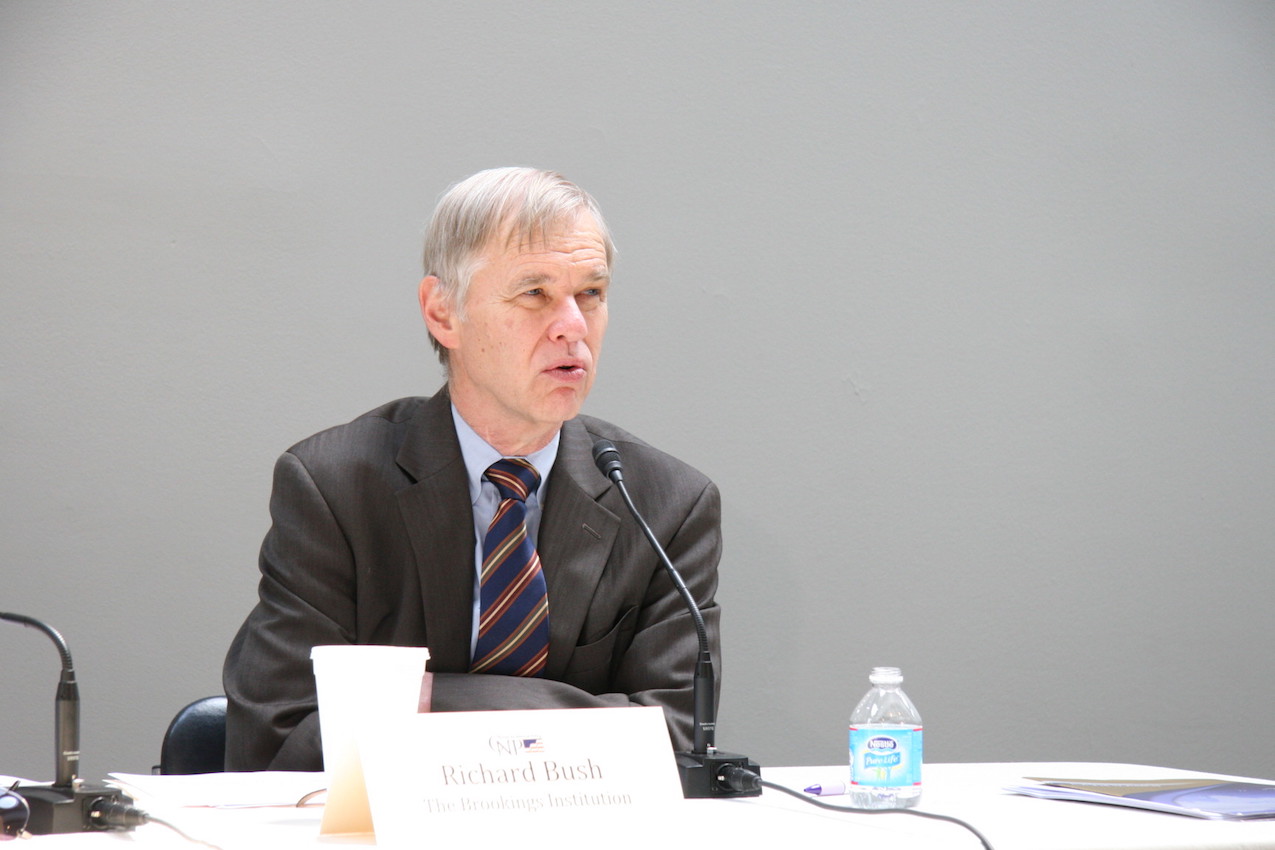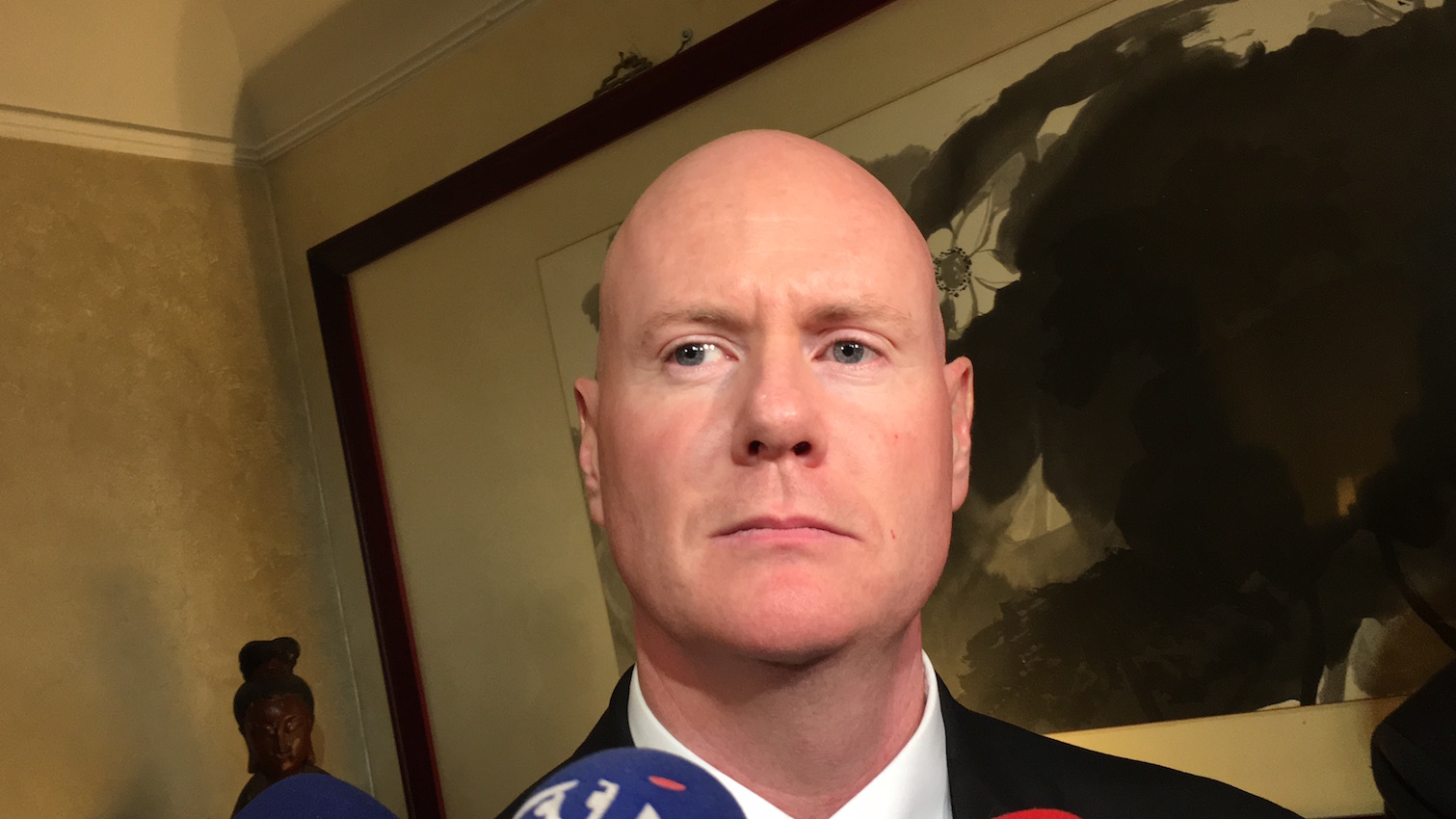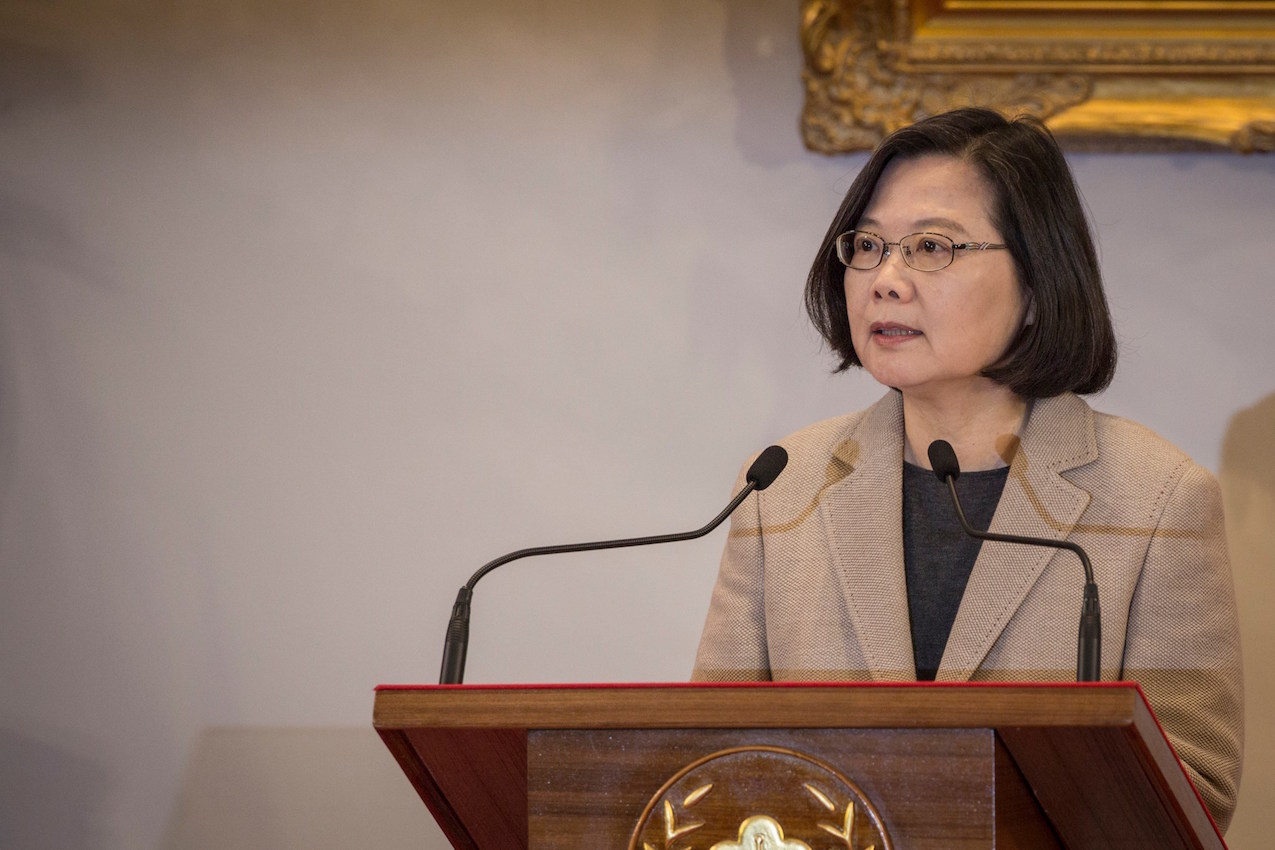by Brian Hioe
語言:
English
Photo Credit: Kevin McCoy/WikiCommons/CC
REPUBLICAN SENATORS Cory Gardner, Marco Rubio, Tom Cotton, John Cornyn, and Ted Cruz recently called on Speaker of the House Nancy Pelosi to invite Taiwanese president Tsai Ing-wen to speak at a session of the US Congress. This would serve as a sign of US support for Taiwan in spite of an officially vague American stance on Taiwan. It remains to be seen how Pelosi will respond to this call, if at all
Yet while many in Taiwan would welcome Tsai addressing the US Congress as a sign of American support in the face of Chinese threats, concerns have been raised by former AIT director Richard C. Bush, among others, regarding the possible implications of such a move. Bush argued against inviting Tsai in an article published on the Brookings Institute website, where Bush currently is a senior fellow of foreign policy and director of the Center for Northeast Asian Policy Studies.
 Richard C. Bush. Photo credit: VOA
Richard C. Bush. Photo credit: VOA
As argued by Bush and others, Tsai addressing the US Congress could prove dangerously provocative of China in a manner that ultimately does not benefit Taiwan. Likewise, Bush suggests because the move to have Tsai speak in front of Congress comes from civilian Congress members, this may actually step on the toes of allies of Taiwan in the State Department and elsewhere. Moreover, according to Bush, as the push for Tsai to speak in front of Congress only comes from Republicans, it does not enjoy bipartisan support as other legislature recently supportive of Taiwan as the Asia Reassurance Initiative Act did, and so could be a risky move. Tsai speaking in front of Congress only at the behest of Republicans could alienate the Democrats whose support would also be needed for America to take stronger action in support of Taiwan in the future, then.
Bush’s article had been preceded by articles in support of a Tsai speech by former China Director for the Secretary of Defense, Joseph Bosco, former Dutch diplomat Gerrit van der Wees, and followed by articles critical of the idea from analyst J. Michael Cole, and political science professor Dennis V. Hickey. Yet as a former AIT head, Bush’s article has received the most attention, and it is clear that it has been the most influential article in terms of divided assessments on the notion of a Tsai invite to Congress; before Bush’s article, one primarily saw arguments in favor of a Tsai invite and afterward, one has primarily seen arguments against a Tsai invite.
Bush later would follow up with an article criticizing Kuo Pei-hung and other members of the Formosa Alliance for their push to hold an independence referendum on Taiwan’s sovereignty. Though Bush stated that he respected Kuo and his efforts to preserve Taiwanese democracy, Bush’s argument was also that this would be dangerously provocative of China.
Bush has received criticism for this line of argument in Taiwan. Nevertheless, with criticisms of Bush, one observes that this is understood sometimes only in the context of the view that support for Taiwan continues to be the domain of staunch, traditional Republican allies of Taiwan. Among some deep Green criticisms, Bush is seen as more closely aligned with the Democratic Clinton administration, under which he served as AIT head, and with the view that Democrats are simply antagonistic towards Taiwan Bush is, for example, criticized with the view that he is simply less supportive of Taiwan because he served as AIT head primarily during the Democratic Clinton administration, this is the reason for his hostility towards the idea of a referendum. Bush’s entreaties to Democratic House Speaker Pelosi, who Bush cites as a respected longtime colleague in his article, are read in a similar vein.
 Stephen J. Yates. Photo credit: VOA
Stephen J. Yates. Photo credit: VOA
As such, among some, anger against Bush for dismissing the idea of a referendum on Taiwanese independence has taken place because of the possibility that this would be upset China, is seen an instance of a Democrat disregarding the will of the Taiwanese people, although it is actually an irrelevant question as to what Bush’s personal politics actually are. It is forgotten by many that, for example, former Deputy National Security Adviser Stephen J. Yates, who is thought of as a traditional Republican ally of Taiwan, has himself stated in the past that he does not believe America would support a referendum on Taiwanese independence either.
There is often a lack of understanding of the dynamics of US domestic politics in Taiwan, with issues only seen according to a narrow frame of whether they immediately benefit or do not benefit Taiwan, and with few political distinctions made apart from that of Democrat and Republican. Indeed, it may be right to point out that Bush seems highly cautious regarding the possibility of offending China through stronger support of Taiwan, but this actually undergirds all American considerations of to what extent it should support Taiwan, Democratic or Republican alike.
It is no surprise then, that AIT would itself follow up on Bush’s comments by stating that America’s official position would preclude support for a referendum on Taiwanese independence. So much for the wishful thinking of many thinkers influential on policy in Taiwan that the current Trump administration is strongly supportive of Taiwan—a belief almost that Taiwan has the unconditional support of the Trump administration.
Bush’s opposition to a referendum does not surprise. Nor should opposition surprise when coming from a Republican such as Yates or anyone else. While Bush is certainly right to warn of possible reprisals from China if Taiwan went ahead with an independence referendum, considerations of what the Taiwanese people want scarcely have any mention in Bush’s argumentation.
 American president Donald Trump. Photo credit: Michael Vadon/Flickr/CC
American president Donald Trump. Photo credit: Michael Vadon/Flickr/CC
Indeed, polling clearly indicates that the majority of Taiwanese currently prefer the status quo to any outright push towards de jure independence that could risk reprisal from China. But what if this were to change, as it likely would under conditions in which the threat of imminent Chinese military aggression seemed on the verge of materializing? Would America be willing to shrug off the democratic will of the Taiwanese people if it went against American interests?
The answer would be yes. And this is a fact that many in Taiwan have scarcely reckoned with, taking the rosy view that America’s support of Taiwan is genuinely with the end of supporting freedom and democracy. Although always couched in rosy terms, American support for Taiwan is always conditional and, whatever America may preach regarding support for Taiwan’s democratic values, it is always calculated primarily on the basis of American interest. Bush’s comments are certainly in this vein.
As such, neither does Bush’s fear of upsetting China over a Tsai invite to Congress surprise, pointing more generally towards that American support for Taiwan is, in fact, limited beyond a certain point of commitment. Even if America may seek to contain growing Chinese power, ultimately, Taiwan is and will always be smaller than China, as a result of which it is always a possibility that America will decide beyond a certain level of risk maintaining relations with China is more important than protecting Taiwan. American presidents who need to win elections are also generally unlikely to pursue warfare with China in a manner that would lead to mass American casualties, seeing as this would severely affect they or their party’s chances of reelection.
It was, in part, America’s prioritization of China over Taiwan which led to Taiwan’s current exclusion from the international world, following America’s decision to formally recognize the People’s Republic of China over the Republic of China in 1979. But, again, many in Taiwan seem to cling to the delusion that America will back Taiwan to a hilt, particularly under the Trump administration. This would not only be a misleading belief but one dangerous to Taiwan.
 Taiwanese president Tsai Ing-wen. Photo credit: Tsai Ing-wen/Facebook
Taiwanese president Tsai Ing-wen. Photo credit: Tsai Ing-wen/Facebook
One does not expect idealization of America in Taiwan to change anytime soon. Nevertheless, it may be long past time for Taiwan to realize that, at the end of the day, American support for Taiwan will only go so far, and that America has no genuine interest in defending Taiwanese democracy apart from protecting its own interests. American support, if any, will always be conditional, and this is what the debate around a possible invite by Tsai Ing-wen to Congress and negative assessments on an independence referendum should remind of.

